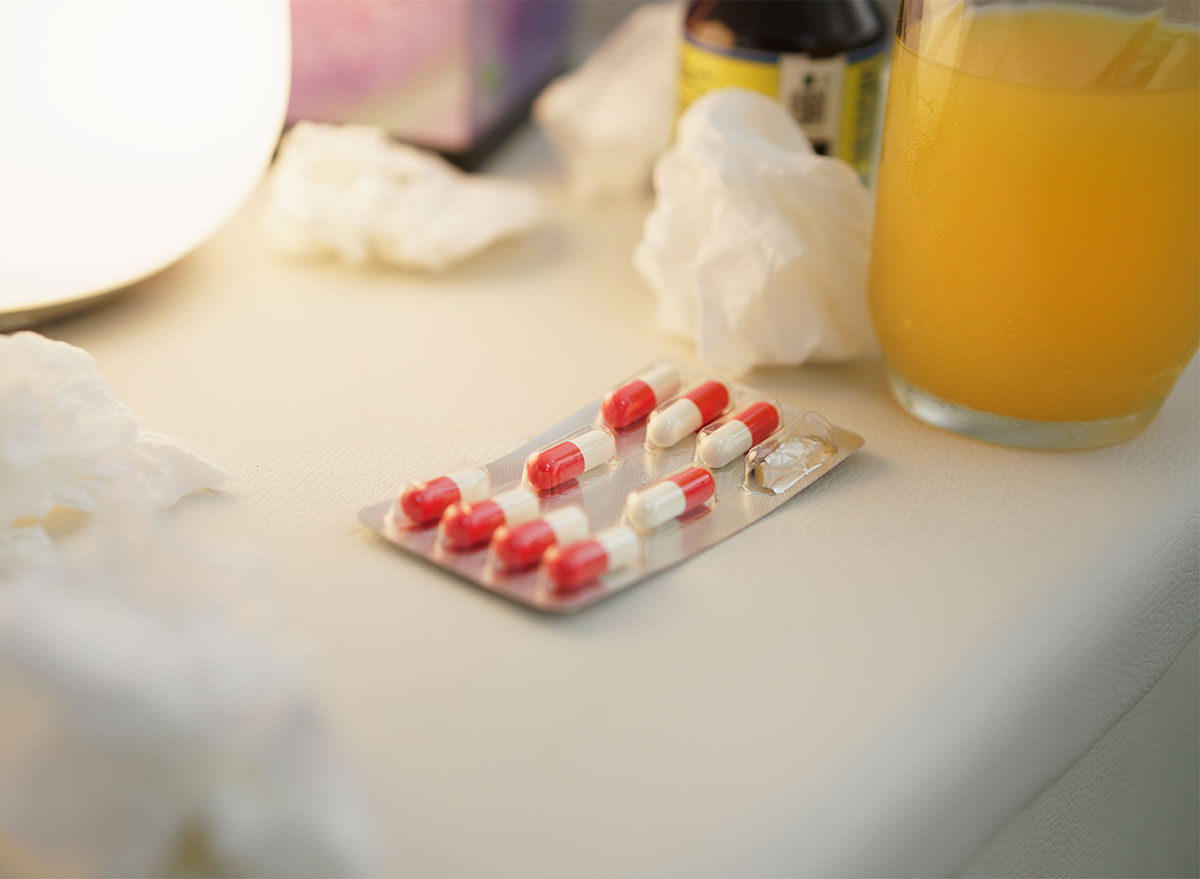12 Warning Signs You Have Poor Gut Health

Your gut has an incredible amount of control over your overall health. But it can be kind of confusing to understand why.
“The gut is another name for the GI or gastrointestinal tract. All of the organs that make up the gut play a role in digestion,” says Brooke Glazer, RDN, nutrition consultant for RSP Nutrition. “We have many trillion microorganisms—bacteria, fungi, yeast, parasites, viruses—that live in and on our bodies. Collectively this is called the microbiome.”
Most of our microbiome actually lives in the colon and weighs the equivalent of 2-3 pounds. (Unlike your belly fat, those are pounds that you don’t want to lose.)
“The gut microbiome contains a mix of good and bad bacteria that helps achieve many important roles in our body: protects against dangerous bacteria, regulates metabolism, aids in digestion, creates vitamins, manages hormone levels, and disposes of toxins,” says Glazer.
So it makes total sense that when your gut health is not well, it impacts numerous parts of our bodies. Here are 12 signs and symptoms that your gut health needs help, and how to fix it, according to experts. Read on, and for more on how to lose weight and mend your gut, you won’t want to miss 13 Foods That Cause Digestive Problems.
You struggle with constipation.

“Your diet may be low in fiber which may help with constipation and bloating,” says Keri Gans, MS, RDN, CDN, author of The Small Change Diet.
How to improve it: “I would suggest gradually increasing one’s intake of high fiber foods, such as fruit, veggies, 100% whole grains, and legumes, along with drinking more water,” says Gans. “A gradual increase is advised because some individuals are prone to bloating as their body adjusts to higher fiber intakes. Also incorporating some type of daily activity to move your body more may help as well.”
You have chronic GI discomfort.

“Chronic GI discomfort like abdominal pain, bloating, gas, diarrhea, constipation, heartburn, nausea are often indicators of compromised gut health. An estimated 10-20% of Americans suffer from some form of chronic GI discomfort—while this is not uncommon, it is also not normal,” says Glazer.
How to improve it: Common GI irritants include high levels of fat, fried foods, caffeine, alcohol, carbonation, gum, dairy, gluten, artificial sweeteners.
“It’s super helpful to get to know your body and learn which of these foods (if any) make your body feel good or not so good. If you suspect that one of these foods is the culprit for you, I recommend cutting it out and seeing if you feel better,” says Glazer.
You bloat up, and get gassy after eating certain foods.

“This could be a sign that you might have an intolerance,” says Mike Gorski, RD, registered dietitian, and owner of MG FitLife.
How to improve it: “I always say, your body will tell you more about you than you think—you just have to be willing to listen. Too many people ignore the signs from their own body that something isn’t sitting right,” says Gorski. “If you always get bloated or gassy after eating a meal, try to find the common denominator in those meals, and cut it out for a solid two weeks. Some common ones are gluten, dairy, and soy.”
You have problems sleeping.

“If you are not getting a good night’s sleep, wake up feeling unrefreshed, or struggle with nighttime awakenings, this could signal gut problems,” says David Gozal, MD, sleep medicine physician at the University of Missouri School of Medicine.
How to improve it: “Eat more fiber in your diet, consume more foodstuff that contains probiotics, get regular exercise, avoid alcohol, and avoid fatty or sugary foods,” says Dr. Gozal.
You have a combination of chronic diarrhea, fatigue, and headache.

“This could be a sign of a ‘leaky gut’, which refers to an unhealthy gut lining where there are gaps between the cells allowing partially digested food, toxins, and bugs to penetrate into tissues beneath it. This can trigger inflammation and changes in the gut bacteria,” says Jonathan Valdez, RDN, owner of Genki Nutrition and media spokesperson for New York State Academy of Nutrition and Dietetics. “This increased intestinal permeability plays a role in gastrointestinal conditions such as celiac disease, Crohn’s disease, and irritable bowel syndrome.”
How to improve it: “Remove foods that can be inflammatory and promote changes in gut bacteria including alcohol, overly processed foods (low fiber, high sugar, high saturated fat), certain medications, and foods that cause allergies or sensitivities,” says Valdez. “Add foods that are nutritious, unprocessed, and anti-inflammatory to help rebuild the gut flora. You may need to consider a low FODMAP diet after speaking with a GI specialist as well.”
You have unexplained fatigue and sluggishness.

The gut is in constant communication with our brain and the microbiome plays a vital role in your mental health and the way you respond to stress,” says Alicia A. Romano, MS, RD, LDN, CNSC, registered dietitian and spokesperson for the Academy of Nutrition and Dietetics. “Food affects how you feel, which manifests in your mood. While mood disorders are not solely regulated by gut health, it is definitely a factor! If you are dealing with new swings in mood or increased anxiety, you may want to tune into your diet and lifestyle and how it may be affecting you at a deeper level.”
How to improve it: First off, always seek professional guidance if you are dealing with depressed mood, anxiety or any other chronic challenges to your mental health,” says Romano. “A few tips: get adequate sleep (at least 7 hours of restful sleep per night), adequate hydration (8 to 10 8-ounce glasses of water or unsweetened, decaffeinated fluids per day), engage in stress management (this may require additional support!), and healthful movement and exercise.”
You recently finished a dose of antibiotics.

“It is known that antibiotics alter our gut microbiome and can put us at risk for nutrient deficiencies. When you have a bacterial infection and are prescribed a dose of antibiotics, the antibiotics are not specific enough to target only the bad bacteria, and the course of antibiotics ends up wiping out many good bacteria as well,” says Glazer.
How to improve it: Probiotics! “Probiotics are live microorganisms found in fermented foods and they are great because they provide more good bacteria for your gut. I always say that it’s best to get probiotics through foods because fermented foods have more bacterial diversity,” says Glazer. “I recommend having 2 tablespoons of fermented food like kimchi or sauerkraut a day and like everything else, it’s great to vary the types of fermented foods you eat.”
You have constant heartburn (acid reflux) after eating certain foods.

“Your stomach and esophagus are part of your digestive tract, and you may be creating too much of an acidic environment,” says Gorski.
How to improve it: “Maybe you are eating too fast, we all do! Take your time between bites. Chew your food. Put your fork down between bites,” says Gorski. “Some foods that can specifically trigger acid reflux are coffee, chocolate, alcohol, greasy foods, highly processed sugary foods—all the fun things. But you need to ask yourself, ‘Is the juice worth the squeeze?’ And in this case, the juice is a miserable pain in your chest after eating that makes doing anything unbearable.”
You have a poor mood or depression.

“Gut microbes help produce metabolites such as bile acids and short-chain fatty acids (SCFA) which influence key intermediates of the serotonin pathway. Serotonin constricts blood vessels and brings on sleep and is also involved in temperature regulation. It also plays a role in intestinal motility, bone metabolism, and immune reaction,” says Valdez. “About 95% of serotonin resides in the gut. Inefficient production of serotonin may lead to disturbances in sleep and mood.”
How to improve it: “Consume fiber, fruits, and vegetables that promote microbiota diversity. The consumption of prebiotics and probiotics help to increase SCFA production which helps produce serotonin,” says Valdez. “Consume foods containing tryptophan and plant-based are seaweed, spinach, watercress, pumpkin leaves, and mushrooms which serve as a precursor to serotonin production.”
You have frequent, painful gas.

“Gas and bloating can be tricky to treat, especially if another diagnosis is looming. For intermittent gas and bloating, I suggest trying the following tricks that may help to reduce the ingestion of air, support proper digestion and reduce potential irritants,” says Romano. “For many, persistent gas may be a sign of a functional GI disorder such as GERD or IBS and would be best evaluated and treated by a GI physician and registered dietitian.”
How to improve it: “A couple tips include slowing down when eating. Reduce carbonated beverages and gum chewing, and consider reducing known gastric irritants: garlic, chocolate, alcohol, spicy foods, greasy fatty foods and large portions are all associated with reflux and upper GI gas,” says Romano. “You may also consider reducing the portion of highly gassy foods in one sitting or over the course of one day- this may include beans, cauliflower, artichokes, brussels sprouts, etc. I would suggest keeping a food and GI symptom log to evaluate for potential foods that may be triggering these symptoms.”
You have frequent illness or infection.

The gut microbiome plays a role in bolstering your immunity. A poor immune response may be a sign of an unhealthy gut. “A study showed those who had lower levels of gut bacteria (caused by taking antibiotics) showed a lower immune response to a flu vaccine compared to a group who had normal gut bacteria,” according to Valdez.
How to improve it: “By oral bacterio-therapy or a well-balanced diet with probiotic foods like yogurt, kimchi, and other fermented foods,” says Valdez. “Oral bacterio-therapy includes using beneficial strains of lactic acid bacteria, such as lactobacillus and bifidobacteria to restore intestinal balance. A well-balanced diet includes a nutritionally varied diet, with the inclusion of dietary fiber and fermented milk. This can help with the stimulation of the immune system and increased resistance to infection.”
You have chronic diarrhea.

“In the case of diarrhea, we are dealing with the rate at which food moves through the GI tract. For diarrhea: food moves quickly through the GI tract, exiting our body in a liquid form, sometimes with undigested food,” says Romano. “The foods we eat, to changes in our schedules, to stress levels, hydration and fiber intake, all have an influence on the way our stool passes.”
How to improve it: Bind it up. “Try adding sources of soluble fiber, those fibers that reabsorb water in the large intestine giving form to the stool,” says Romano. “Soluble fiber sources include oats, peas, beans, apples, citrus fruits, carrots, barley, and psyllium. Limit high sugar foods and large amounts of fluids with meals. Avoid engaging in exercise or a lot of movement immediately after meals, as this will make foods pass through the GI tract more quickly.” For more ways to improve your gut health, read up on these 25 Unhealthiest Habits for Your Digestion.








